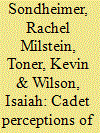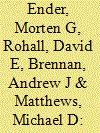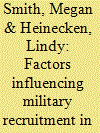|
|
|
Sort Order |
|
|
|
Items / Page
|
|
|
|
|
|
|
| Srl | Item |
| 1 |
ID:
117624


|
|
|
|
|
| Publication |
2013.
|
| Summary/Abstract |
Evidence of an actual or perceived gap in ideological beliefs between civilian and military communities informs current debates on the military and its relationship to broader society. The authors examine one cohort of the military and its members' perception of their own ideology in relation to their civilian counterparts using a 2009 survey of cadets at the United States Military Academy. The authors ascertain cadet perceptions of (1) cadet ideological leanings on individual and aggregate levels, (2) the ideological leanings of the civilian population, and (3) the civilian population's assessment of the military's ideological leanings. The authors attempt to discern whether or not this military subpopulation perceives itself as different from the rest of society. The authors find that while members of the Army's future officer corps perceive themselves as more conservative than their civilian peers and society writ large, as a group they hold rather moderate political views.
|
|
|
|
|
|
|
|
|
|
|
|
|
|
|
|
| 2 |
ID:
109950


|
|
|
|
|
| Publication |
2012.
|
| Summary/Abstract |
The authors investigate a gap in attitudes toward homosexuals in the U.S. military among a select group of people-American civilian undergraduates, Reserve Officer Training Corp (ROTC) cadets, and cadets at military academies. Using a subsample (N = 3057) of data from the Biannual Attitude Survey of Students (BASS), being a military academy cadet is associated with the strongest agreement for barring homosexuals from serving in the military, followed by ROTC cadets and civilians. These trends continue when controlling for respondents' sex and political affiliation-the two most significant predictors of agreeing to bar homosexuals from military service. A small reduction in agreement for barring was found among academy cadets over time.
|
|
|
|
|
|
|
|
|
|
|
|
|
|
|
|
| 3 |
ID:
131091


|
|
|
|
|
| Publication |
2014.
|
| Summary/Abstract |
This research sets out to establish how the youth in South Africa view military service, and what factors affect the ability of the South African National Defence Force (SANDF) to attract suitable recruits to staff its modern, technologically advanced military. Due to high levels of youth unemployment, South Africa has sufficient persons volunteering for military service. The problem lies with recruiting sufficient quality personnel with the right profile and abilities. To establish what affects enlistment, focus group discussions were conducted with learners from eight schools to determine what influences their career choices, what deters them from or attracts them to military service, their perception of the military profession, their knowledge of the military, and the influence of factors such as race and gender. The conclusion is reached that the SANDF is not considered an employer of choice due to poor service conditions, a decline in the prestige of the military, unfavourable aspects associated with military culture, a growing 'knowledge gap' and disconnect between the military and South African society, the estrangement of certain race groups, and the masculine nature of the military. These aspects need to be addressed if the SANDF wishes to attract learners with good academic credentials.
|
|
|
|
|
|
|
|
|
|
|
|
|
|
|
|
| 4 |
ID:
114024


|
|
|
|
|
| Publication |
2012.
|
| Summary/Abstract |
Public opinion studies on war attitudes say little about civilians who are related to military service members. The authors argue that military "service-connected" individuals are missing voices in the research that examines public support for war. Using over 50,000 observations from the 2010 Cooperative Congressional Election Study, the authors estimate attitudes toward the war in Iraq, the war in Afghanistan, and the use of US military troops in general. The authors find that service-connected civilians express greater support for war and the use of troops than civilians without such a connection. This study discusses the implications of these findings for theoretical advancements in the literature addressing war attitudes and the conceptualization of the "civil-military gap."
|
|
|
|
|
|
|
|
|
|
|
|
|
|
|
|
|
|
|
|
|